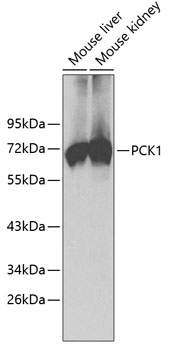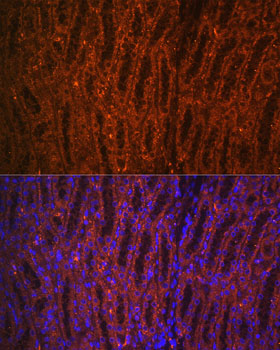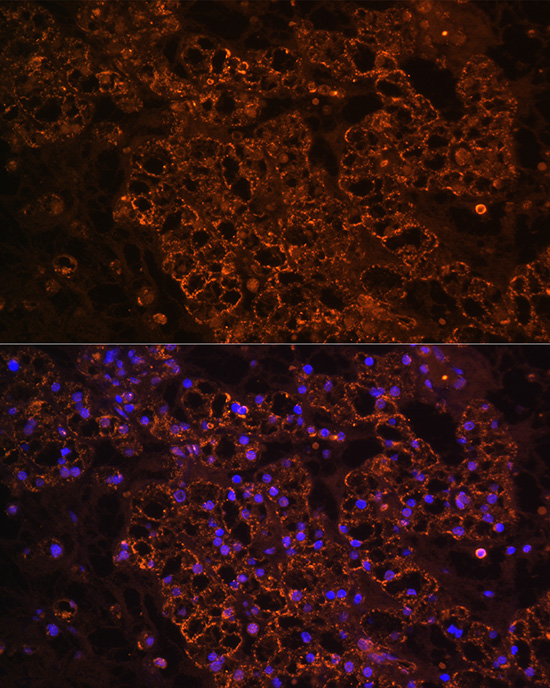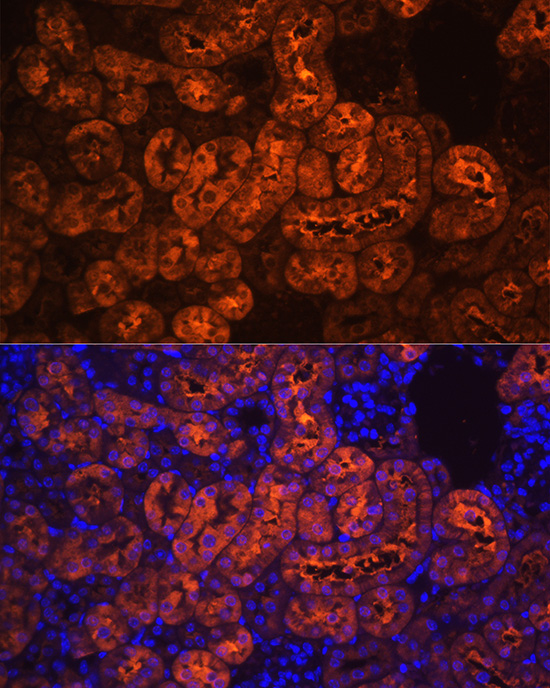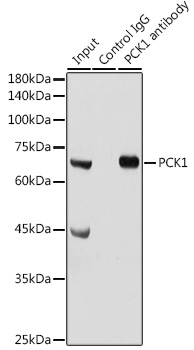Metabolism Antibodies 2
Anti-PCK1 Antibody (CAB2036)
- SKU:
- CAB2036
- Product Type:
- Antibody
- Reactivity:
- Human
- Reactivity:
- Mouse
- Reactivity:
- Rat
- Host Species:
- Rabbit
- Isotype:
- IgG
- Research Area:
- Metabolism
Description
| Antibody Name: | Anti-PCK1 Antibody |
| Antibody SKU: | CAB2036 |
| Antibody Size: | 20uL, 50uL, 100uL |
| Application: | WB IF IP |
| Reactivity: | Human, Mouse, Rat |
| Host Species: | Rabbit |
| Immunogen: | A synthetic peptide corresponding to a sequence within amino acids 520 to the C-terminus of human PCK1 (NP_002582.3). |
| Application: | WB IF IP |
| Recommended Dilution: | WB 1:1000 - 1:2000 IF 1:50 - 1:200 IP 1:50 - 1:200 |
| Reactivity: | Human, Mouse, Rat |
| Positive Samples: | Mouse liver, Mouse kidney |
| Immunogen: | A synthetic peptide corresponding to a sequence within amino acids 520 to the C-terminus of human PCK1 (NP_002582.3). |
| Purification Method: | Affinity purification |
| Storage Buffer: | Store at -20'C. Avoid freeze / thaw cycles. Buffer: PBS with 0.02% sodium azide, 50% glycerol, pH7.3. |
| Isotype: | IgG |
| Sequence: | DKEG KFLW PGFG ENSR VLEW MFNR IDGK ASTK LTPI GYIP KEDA LNLK GLGH INMM ELFS ISKE FWEK EVED IEKY LEDQ VNAD LPCE IERE ILAL KQRI SQM |
| Gene ID: | 5105 |
| Uniprot: | P35558 |
| Cellular Location: | Cytoplasm |
| Calculated MW: | 34kDa/69kDa |
| Observed MW: | 69kDa |
| Synonyms: | PCK1, PEPCK-C, PEPCK1, PEPCKC |
| Background: | This gene is a main control point for the regulation of gluconeogenesis. The cytosolic enzyme encoded by this gene, along with GTP, catalyzes the formation of phosphoenolpyruvate from oxaloacetate, with the release of carbon dioxide and GDP. The expression of this gene can be regulated by insulin, glucocorticoids, glucagon, cAMP, and diet. Defects in this gene are a cause of cytosolic phosphoenolpyruvate carboxykinase deficiency. A mitochondrial isozyme of the encoded protein also has been characterized. |
| UniProt Protein Function: | PCK1: Catalyzes the conversion of oxaloacetate (OAA) to phosphoenolpyruvate (PEP), the rate-limiting step in the metabolic pathway that produces glucose from lactate and other precursors derived from the citric acid cycle. Defects in PCK1 are the cause of cytosolic phosphoenolpyruvate carboxykinase deficiency (C-PEPCKD). A metabolic disorder resulting from impaired gluconeogenesis. It is a rare disease with less than 10 cases reported in the literature. Clinical characteristics include hypotonia, hepatomegaly, failure to thrive, lactic acidosis and hypoglycemia. Autoposy reveals fatty infiltration of both the liver and kidneys. The disorder is transmitted as an autosomal recessive trait. Belongs to the phosphoenolpyruvate carboxykinase [GTP] family. |
| UniProt Protein Details: | Protein type:Kinase, other; Carbohydrate Metabolism - citrate (TCA) cycle; Carbohydrate Metabolism - pyruvate; Lyase; Carbohydrate Metabolism - glycolysis and gluconeogenesis; EC 4.1.1.32 Chromosomal Location of Human Ortholog: 20q13.31 Cellular Component: cytoplasm; cytosol Molecular Function:GDP binding; GTP binding; carboxylic acid binding; manganese ion binding; phosphoenolpyruvate carboxykinase (GTP) activity; magnesium ion binding Biological Process: oxaloacetate metabolic process; carbohydrate metabolic process; glucose metabolic process; pathogenesis; response to activity; drug metabolic process; glucose homeostasis; internal protein amino acid acetylation; glycerol biosynthetic process from pyruvate; response to insulin stimulus; gluconeogenesis Disease: Phosphoenolpyruvate Carboxykinase Deficiency, Cytosolic |
| NCBI Summary: | This gene is a main control point for the regulation of gluconeogenesis. The cytosolic enzyme encoded by this gene, along with GTP, catalyzes the formation of phosphoenolpyruvate from oxaloacetate, with the release of carbon dioxide and GDP. The expression of this gene can be regulated by insulin, glucocorticoids, glucagon, cAMP, and diet. Defects in this gene are a cause of cytosolic phosphoenolpyruvate carboxykinase deficiency. A mitochondrial isozyme of the encoded protein also has been characterized. [provided by RefSeq, Jul 2008] |
| UniProt Code: | P35558 |
| NCBI GenInfo Identifier: | 93138710 |
| NCBI Gene ID: | 5105 |
| NCBI Accession: | P35558.3 |
| UniProt Secondary Accession: | P35558,Q8TCA3, Q9UJD2, A8K437, B4DT64, |
| UniProt Related Accession: | P35558 |
| Molecular Weight: | 622 |
| NCBI Full Name: | Phosphoenolpyruvate carboxykinase, cytosolic |
| NCBI Synonym Full Names: | phosphoenolpyruvate carboxykinase 1 (soluble) |
| NCBI Official Symbol: | PCK1 |
| NCBI Official Synonym Symbols: | PEPCK1; PEPCKC; PEPCK-C |
| NCBI Protein Information: | phosphoenolpyruvate carboxykinase, cytosolic [GTP]; phosphoenolpyruvate carboxykinase, cytosolic [GTP]; PEP carboxykinase; phosphopyruvate carboxylase; phosphoenolpyruvate carboxylase |
| UniProt Protein Name: | Phosphoenolpyruvate carboxykinase, cytosolic [GTP] |
| Protein Family: | Protein kinase |
| UniProt Gene Name: | PCK1 |
| UniProt Entry Name: | PCKGC_HUMAN |


